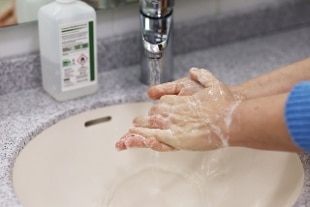Share
19 October 2021 Almost two years after the outbreak of the pandemic, Italians have learned to wash their hands. They are, in fact, the second in Europe in terms of hygiene, surpassed only by Germany, but with the best increase, having bridged the gap that separated them from the Nordic countries in a very short time. But if this behavior, evidently adopted to stem Covid-19, sees Italians excel, on the front of social distancing it seems that the opening effect weighs more: kisses on the cheeks and handshakes are returning to pre-2020 levels. This is what emerges from the European Hygiene Observatory study, carried out by Ifop, Institut français d'opinion publique, for XLoveCam carried out through an online self-administered questionnaire from 7 to 8 July 2021 on 5,039 people aged 18 and over,composed of a representative sample of the Italian, Spanish, French, German and British populations.
The study
The study wanted to investigate the social changes in the so-called 'barrier gestures' (wearing a mask, healthy without physical contact, hand hygiene, etc.) after the last lockdown, which are so important even in time for the green pass, even in light of the fact that the winter season is upon us, favorable to the exchange of microbes and bacteria of all kinds, including colds and the common flu.
Hand hygiene
Italians have learned to wash their hands often and for a long time. Today 83% wash them after going to the bathroom: only the Germans do better than us, with a spread of just 3% (they are in fact 86%). Followed by the United Kingdom with 82%, Spain with 77% and lastly France with 76% (the European average is equal to 80%). Italy is first in Europe also for washing hands before meals (78%, against 60% in Europe) and before cooking (76%, exactly on average with Europe), after having used public transport ( 77%, compared to 62% in Europe) and after touching an animal (63%, only 46% in Europe). And again: 80% wash their hands when they return home (62% in Europe), and 76% before caring for a baby (68% in Europe).
The worst English in Europe
Compliance with hand hygiene instructions is generally lower in the Northern countries (Germany, UK) than in the Southern regions (Spain, Italy), with the British being worse in Europe when it comes to washing their hands first going to dinner (48%), returning home (51%) or after taking public transport (50%). Italy is also the most 'diligent', according to the study, when it comes to washing hands after blowing one's nose with 42% against 27% of France, which is in last place, first the British with the 71%, the French last with 53%.
The use of the "kiss" to family members
Italy is also second in the use of single-use handkerchiefs (45% against 43% in Europe: France remains first with 49%, Great Britain the worst with 37%). Here, too, the pandemic effect is evident. On the other hand, what Covid has not been able to defeat is the habit of greeting each other by kissing on the cheeks. According to the European Hygiene Observatory, the "kiss" to family members remains customary in Italy (61%) and Spain (66%) against 51% of the European average. The kiss to acquaintances sees Italy settle at the European average (only one in three, 29% against 30%) while the worst in Europe in terms of social distancing are the Spaniards with 49% of people who have not stopped handing out kisses to friends and family.
The handshake
Handshake chapter: eighteen months after being banned from social habits due to health restrictions, Italians are second in Europe: 37% against an average of 35% in Europe and 44% in Spain, 35% in Germany, 30% in Great Britain and France.
As for the handshake of strangers, Italy stands at 20%, below the European average of 22%.
The worst in terms of barrier gestures are the Spaniards and the British (30% and 27%).

